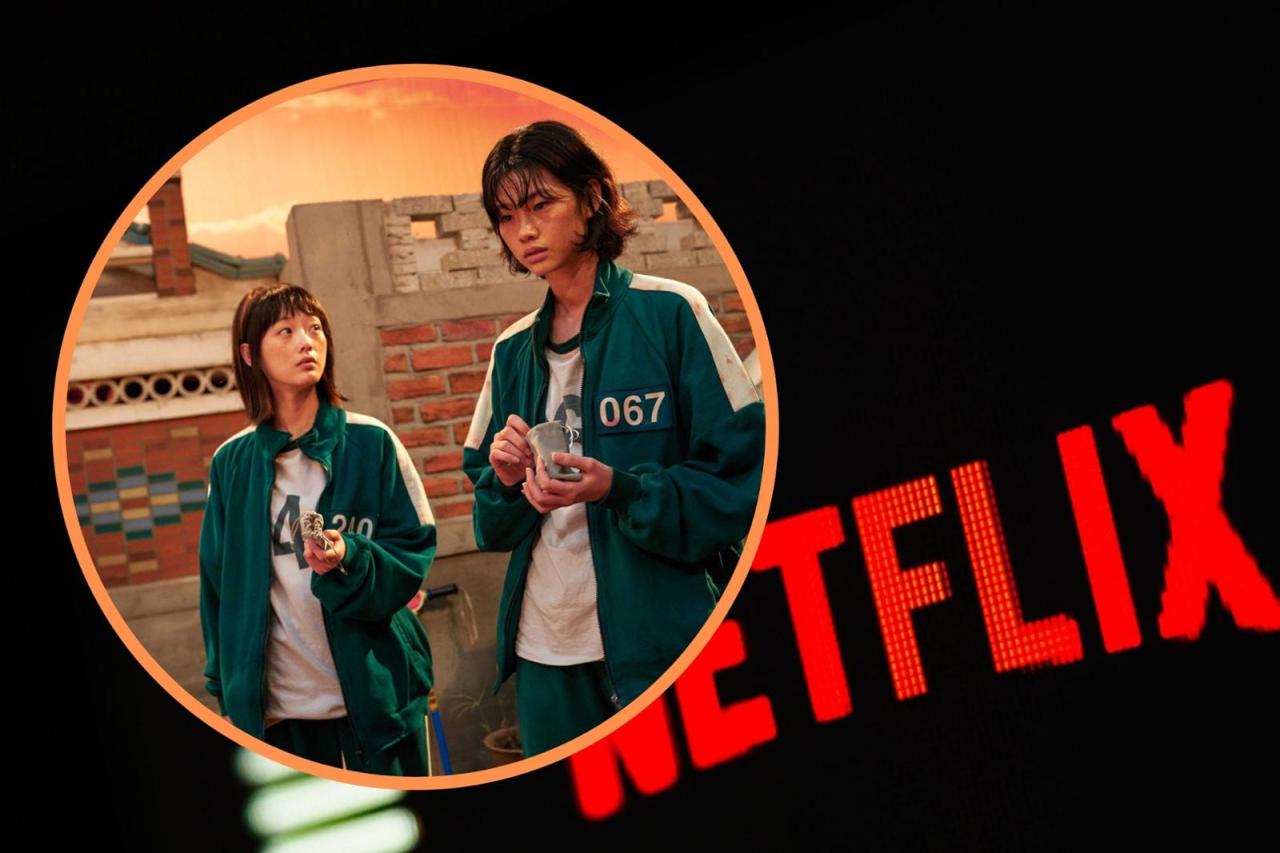Squid Game Histoire Vraie? The hit Netflix show, “Squid Game,” sparked global conversations about its brutal games and desperate contestants. But how much of this dark drama reflects the realities of South Korean society? This exploration delves into the socio-economic pressures, the struggles with debt, and the cultural context that inspired the show’s chilling narrative. We’ll examine the show’s depiction of debt and inequality against the backdrop of actual economic conditions in South Korea.
We’ll also look at the traditional Korean children’s games used in the series, exploring their cultural significance and comparing them to their real-world counterparts.
Through analyzing the show’s inspiration and comparing it to real-life situations, we’ll uncover the extent to which “Squid Game” mirrors – and perhaps exaggerates – the harsh realities faced by some individuals in South Korea. We’ll see how the show uses familiar children’s games to highlight the desperate stakes of survival in a system where the odds are stacked against the vulnerable.
So you’re wondering about “Squid Game histoire vraie”? While the show’s fictional, the harsh realities it depicts sadly resonate with real-world struggles. Think about the desperation that might drive someone to take such risks; it’s a reminder that understanding the rules and regulations in other areas is just as important, like checking out the new drone rules in Canada at new drone rules canada to ensure safe and responsible flying.
Ultimately, both the show and drone regulations highlight the need for awareness and responsible action.
The Inspiration Behind “Squid Game”
The global phenomenon that is “Squid Game” didn’t emerge from a vacuum. Its dark and compelling narrative is deeply rooted in the socio-economic realities of South Korea, reflecting anxieties about debt, inequality, and the pressures of a highly competitive society.
Socio-Economic Factors Influencing “Squid Game”, Squid game histoire vraie
South Korea’s rapid economic growth has come at a cost. While the nation boasts technological advancements and a thriving global economy, significant disparities exist. A highly competitive education system, coupled with the pressure to succeed financially, contributes to immense stress and anxiety. The relentless pursuit of upward mobility often leaves individuals vulnerable to exploitation and financial ruin.
Real-Life Struggles of Debt-Ridden Individuals in South Korea
Many South Koreans grapple with crippling debt, often stemming from educational loans, housing costs, or business failures. The stigma associated with debt can lead to isolation and desperation. Some individuals resort to extreme measures to alleviate their financial burdens, highlighting the stark realities that mirror the desperation portrayed in “Squid Game”. The lack of adequate social safety nets exacerbates these struggles, leaving many feeling abandoned and without options.
Examples of Extreme Survival Games or Competitions from Korean Culture or History
While “Squid Game” presents a fictionalized extreme, the concept of high-stakes competition isn’t entirely foreign to Korean culture. Traditional games, though not as deadly, often involved intense competition and the potential for significant consequences, reflecting a cultural emphasis on perseverance and resilience. Historical accounts also reveal instances of individuals facing life-or-death situations due to famine or war, creating a context for understanding the show’s intense scenarios.
Stories of Economic Disparity and Desperation in South Korea

News reports frequently detail stories of individuals struggling with overwhelming debt, leading to severe consequences. These narratives, often involving suicide or desperate attempts to escape financial ruin, provide a chilling backdrop to the show’s themes. The stark contrast between the affluence of a small elite and the struggles of the majority serves as a powerful commentary on societal inequalities.
Debt and Economic Inequality in South Korea
The prevalence of debt and income inequality in South Korea are central themes explored in “Squid Game”. Understanding these factors is crucial to grasping the show’s impact and its resonance with viewers worldwide.
Prevalence of Debt and its Impact on Korean Society

High levels of household debt are a significant concern in South Korea. This debt impacts various aspects of society, from mental health to consumer spending. The pressure to maintain appearances and keep up with societal expectations often contributes to excessive borrowing, creating a cycle of debt that is difficult to escape.
Depiction of Debt in “Squid Game” Compared to Reality
“Squid Game” exaggerates the desperation driven by debt, but the underlying reality isn’t far removed from the show’s depiction. The intense pressure to repay loans and the devastating consequences of failure resonate with the experiences of many South Koreans facing financial hardship. While the games are fictional, the desperation and consequences are grounded in real-life struggles.
Social Safety Nets (or Lack Thereof) for Those Struggling with Debt
South Korea’s social safety net, while improving, is still insufficient to adequately support those struggling with severe debt. Limited access to affordable housing, healthcare, and mental health services further exacerbates the challenges faced by individuals in vulnerable situations. The lack of comprehensive support systems contributes to the sense of desperation and hopelessness that drives the narrative of “Squid Game”.
Income Inequality in South Korea
Data on income inequality in South Korea reveals a significant gap between the wealthiest and poorest segments of the population. This disparity fuels social tensions and contributes to the feelings of injustice and resentment that are central to “Squid Game’s” narrative. The show highlights the consequences of a system that leaves many behind in the pursuit of economic growth.
Child’s Play and Korean Culture

The seemingly innocent children’s games in “Squid Game” hold deeper symbolic meaning, reflecting aspects of Korean culture and the evolution of play over time. Understanding the context of these games enhances the appreciation of the show’s complex narrative.
Significance of Traditional Korean Children’s Games and Their Evolution
Traditional Korean children’s games often involved teamwork, strategy, and a sense of community. Over time, with the shift towards a more individualistic and competitive society, many of these traditional games have declined in popularity. The games chosen for “Squid Game” represent a nostalgic yet twisted reflection of this cultural shift.
Comparison of “Squid Game” Games with Real-Life Korean Children’s Games
The games in “Squid Game,” while retaining elements of their real-life counterparts, are twisted and amplified to heighten the stakes and emphasize the desperation of the players. The familiar setting of childhood games contrasts sharply with the brutal consequences, creating a disturbing and memorable effect.
So you’re wondering about “squid game histoire vraie”? While the show’s fictional, its themes of desperation and inequality resonate with real-world struggles. To get a glimpse into the lavish, almost unbelievable world of the ultra-rich potentially fueling such desperation, check out this article on vip 3 squid game. Understanding the lifestyles depicted helps you better grasp the show’s commentary on societal disparities and the “squid game histoire vraie” implications.
Symbolic Meaning of the Games in “Squid Game”
Each game in “Squid Game” carries symbolic weight. They represent the struggles of survival, the harsh realities of competition, and the societal pressures that lead to desperation. The simplicity of the games belies the complex themes they represent, adding layers of meaning to the show’s narrative.
Comparison Table: “Squid Game” Games vs. Real-Life Counterparts
| Game Name | “Squid Game” Rules | Real-Life Rules | Cultural Significance |
|---|---|---|---|
| Red Light, Green Light | Deadly version with a robotic doll; failure results in death. | Simple children’s game involving stopping and starting on command. | Represents obedience and the consequences of failure in a highly structured society. |
| Honeycomb (Dalgoona Candy) | Players must carefully carve shapes from a brittle candy; failure results in death. | Traditional Korean street food game testing skill and patience. | Represents the fragility of life and the need for precision under pressure. |
| Tug-of-War | Teams compete; losing team is eliminated. | Traditional game emphasizing teamwork and strength. | Highlights the importance of cooperation and the brutal realities of competition. |
| Marbles | Players gamble their marbles; losers are eliminated. | Traditional game of skill and chance. | Represents trust, betrayal, and the desperation to survive. |
Last Point: Squid Game Histoire Vraie
Ultimately, “Squid Game Histoire Vraie” reveals a complex interplay between fiction and reality. While the show’s extreme scenarios are dramatized, the underlying themes of economic inequality, crushing debt, and the pressure to succeed resonate deeply with the struggles faced by many in South Korea and beyond. The show serves as a stark reminder of the human cost of societal pressures and the desperate measures some individuals might take when faced with insurmountable odds.
So, you’re wondering about “Squid Game histoire vraie”? While the show’s fictional, the desperation it portrays sadly reflects real-world struggles. Think about the ingenuity needed to survive such a situation, similar to the tech behind the innovative ukrainian sea drone technology used in modern warfare. The resourcefulness shown in both, the show’s games and the drone’s development, highlights human adaptability in the face of extreme circumstances.
Ultimately, “Squid Game histoire vraie” prompts us to consider the harsh realities some face globally.
It’s a compelling narrative that prompts crucial questions about social responsibility and economic fairness.
Questions and Answers
Is “Squid Game” based on a true story?
No, “Squid Game” is not based on one specific true story. However, it draws inspiration from real-life socio-economic issues in South Korea, such as high levels of debt and income inequality.
Were the games in “Squid Game” actually played by children in Korea?
Many of the games are based on traditional Korean children’s games, but the deadly consequences depicted in the show are fictional.
How prevalent is debt in South Korea?
South Korea has a relatively high household debt-to-GDP ratio, leading to significant financial strain for many citizens.
What social safety nets exist in South Korea to help people struggling with debt?
While some social safety nets exist, their effectiveness in addressing the widespread issue of debt is a subject of ongoing debate.
